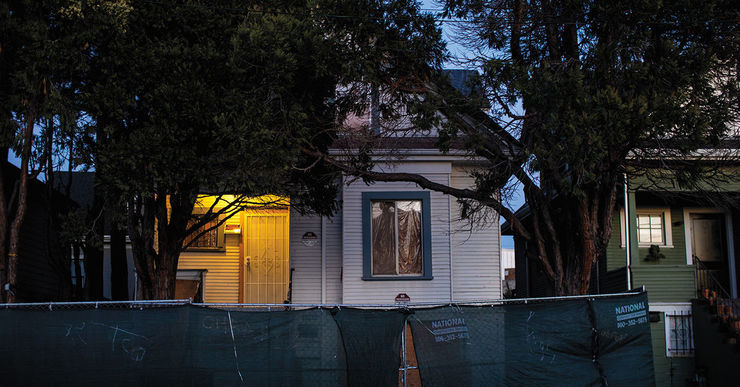As we shelter in place , loyal readers, I am reminded of the generosity of our reading community. Many of you have reached out to say hi, let me know that you appreciate the articles, and sent in poems and photos that are bringing you comfort. Thank you. This week’s pieces explore a range of topics,
As we shelter in place, loyal readers, I am reminded of the generosity of our reading community. Many of you have reached out to say hi, let me know that you appreciate the articles, and sent in poems and photos that are bringing you comfort. Thank you.
This week’s pieces explore a range of topics, including the housing crisis in the Bay Area, the role of race at colleges and universities, the rise of artificial intelligence in K-12 education, and the ability of humans to adapt and survive (especially when they’re on TV). If you have time for just one, I’d recommend the lead article, “The House on Magnolia Street,” even if you’re not from the Bay Area.
+ Our Article Club discussions of “The Crane Wife” went extremely well, thanks to author CJ Hauser, who joined Becky, Jennifer, Tony, Peter, Michele, Jessica, Dan, Kati, Sonya, Carina, Summer, Jim, Samantha, and Marni. If you might be interested in participating next month, you can sign up for Article Club here.

Moms 4 Housing: How Black Mothers Took On The Housing Crisis in Oakland
Last November, Dominique Walker and a group of homeless Black mothers, along with their children, took over a foreclosed and vacant house in West Oakland. Bringing awareness to gentrification and the housing crisis in Oakland, where more than 4,000 people are homeless and the median rent is $3,000 a month, Moms 4 Housing denounced Wedgewood and other real estate companies for buying up properties in Black communities and leaving them empty. There wouldn’t be a housing crisis, they argue, if vacant homes were made available to homeless people. (21 min)
Black Girl, White College
When Erianna Jiles applied to college, she wanted the movie experience: lush green lawns, old stately buildings, and friends playing Frisbee. But as one of the few Black students at North Dakota State, Erianna never felt comfortable. “It was the hardest year of my life,” she says. Erianna shares her frustrating experience in this podcast episode. (At least there’s a happy ending.) (29 min)
+ Teachers and counselors, looking for an assignment in this time of distance learning? Your students would enjoy listening to this podcast.

Can Computers Replace Teachers?
With schools closed, stressed-out parents taking care of their kids while trying to work from home, and teachers cobbling together lesson plans appropriate for distance learning, the notion that artificial intelligence will soon replace conventional classroom instruction seems likes a farce. But the pandemic, which has forced 850 million children out of school, has led some technology evangelists to argue that maybe we don’t need teachers at all. (20 min)
Naked And Afraid
You won’t find me auditioning for Survivor or any other survivalist reality TV show, including Naked and Afraid, anytime soon. But this outstanding first-person account by adventurer Blair Braverman suggests that if you want something truly transformative to happen in your life, the best idea is to get naked, find a secluded place out in the middle of nowhere, and make sure you have no food. Are you up for this? (40 min)
+ As if surviving in the wilderness isn’t enough, Ms. Braverman also mushes dogs with her husband, Quince Mountain, and has competed in the Iditarod.
+ Reader Annotations: After reading last week’s standout article, “Just Desserts,” loyal reader Julie pointed out that the documentary Cheer, also set in Corsicana, Texas, referred to Collin Street Bakery, home of fruitcake fortune embezzler Sandy Jenkins. Maybe all things intriguing come from Texas?
Loyal reader Kati enjoyed “In Defense of Public Knitting” (#227) and has received backlash when she has participated in the practice:
I belong to our local Stitch ’n Bitch group in Fremont. We are sometimes met with disdain when we meet in public, but that’s generally (I think) because we only purchase one drink and then tie up the table for three hours. But the knitting definitely has something to do with it. People get more used to seeing knitting as time goes by, although the performance artist mentioned in the article — now, that was a bit much. And to anyone who belittles knitting, I’d love to see them try and knit. It’s hard! I’m not very good.
Thank you, Julie and Kati, for sharing your thoughts. Loyal readers, don’t be shy. Feel free to hit reply and contribute.
Thank you for reading today’s issue! Let me know what you thought by hitting reply or by clicking on the thumbs below. Also, let’s welcome our community’s four new subscribers: Cami, Jodie, Curt, and Savitha. I hope that you find this newsletter a welcome addition to your Thursday email inbox.
If you really like The Highlighter, please help it grow and get better. I appreciate your support. Here are a few ways you can help:
- Forward this newsletter to a friend and urge them to subscribe
- Buy me a coffee or become the newsletter’s 28th VIP member
- Host a Highlighter reading party via Zoom, where loyal readers sign on, say hi, then read the newsletter for an hour in silence
On the other hand, if the newsletter is not a great match for your inbox, please unsubscribe. See you next Thursday at 9:10 am!
Join the conversation